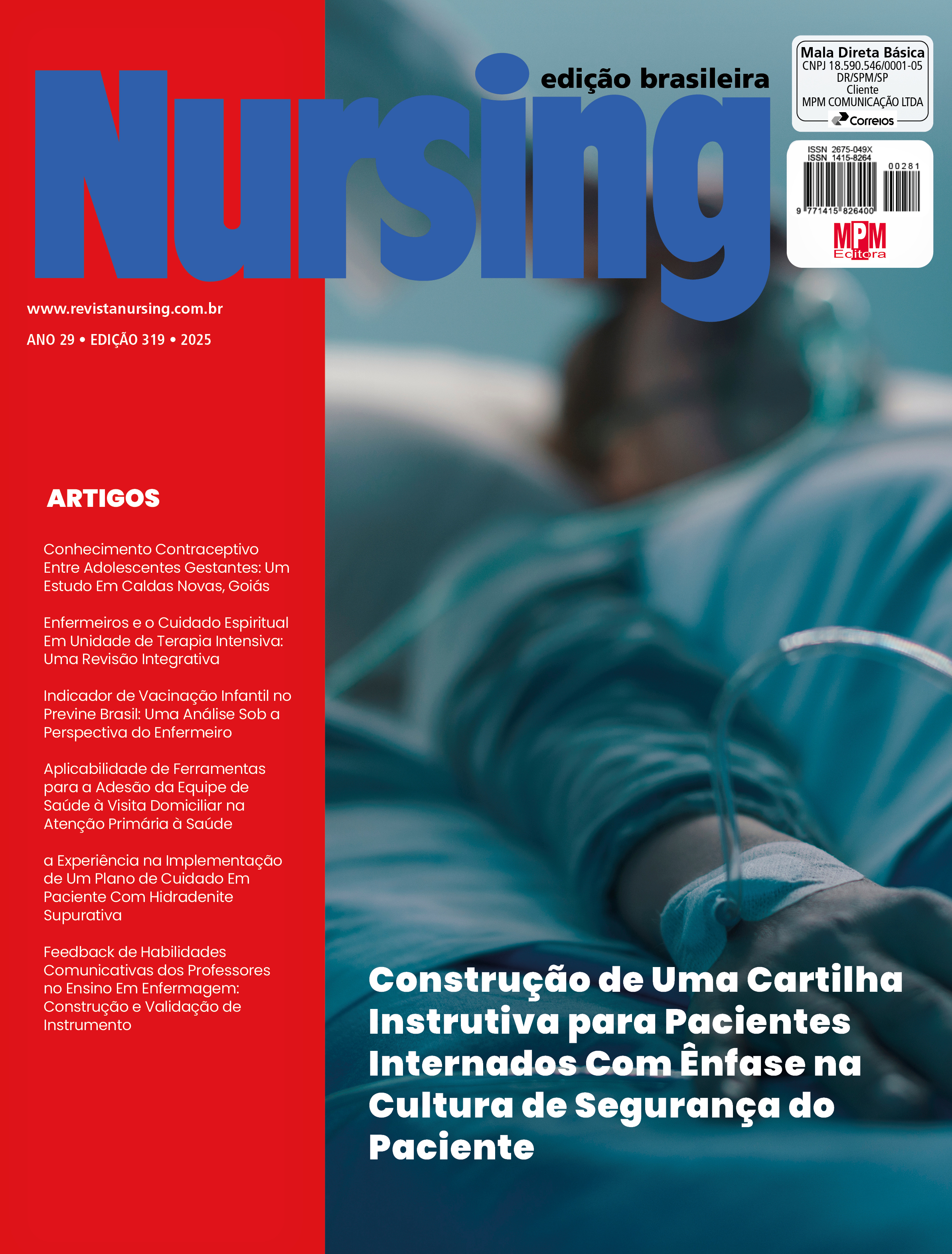Feedback on Teachers' Communicative Skills in Nursing Education: Instrument Construction and Validation
DOI:
https://doi.org/10.36489/nursing.2025v29i319p10385-10391Keywords:
Validation Study, Feedback, Communication, Learning, NursingAbstract
Objective: To construct and validate an instrument to assess feedback on nursing professors' communication skills based on students' perceptions. Method: A methodological study conducted in 8 stages, at two public higher education institutions. The construction was based on theoretical frameworks of communication and the importance of teaching staff's communication skills, culminating in a Likert scale with 24 statements. Content validation was carried out, construct validity was assessed through exploratory factor analysis, and reliability was verified using Cronbach's alpha coefficient. Results: The Cronbach's alpha value was 0.97. Content validation demonstrated objectivity and precision (90%), credibility, clarity, and relevance (81%). After adjustments, the instrument was applied to 10 students in the pre-test phase. The factor analysis (n=162) organized the instrument into four domains and 22 statements. Conclusion: The instrument is valid and reliable and can be used to assess feedback on communication skills.
References
Catherine P, Patersonb N, Jacksonc W, Work F. What are students' needs and preferences for academic feedback in higher education? A systematic review. Nurse Educ Today. 2020; 85:104236. https://doi.org/10.1016/j.nedt.2019.104236
Montes LG, Rodrigues CIS, Azevedo GR. Assessment of feedback for the teaching of nursing practice. Rev Bras Enferm. 2019; 72(3):663-70. http://dx.doi.org/10.1590/0034- 7167-2018-0539
Ferreira RMF, Nunes ACP. A formação contínua no desenvolvimento de competências do professor de enfermagem. Rev Gaúcha Enferm. 2019; 40: e20180171. https://doi.org/10.1590/1983- 1447.2019.20180171
Killingbacka C, Druryb D, Mahatoc P, Williams J. Student feedback delivery modes: A qualitative study of student and lecturer views. Nurse Educ Today. 2020; 84: 104237. https://doi.org/10.1016/j.nedt.2019.104237
Henderson M, Ryan T, Phillips M. The challenges of feedback in higher education. Assess Eval High Educ. 2019; 44: 1237–52. https://doi.org/10.1080/ 02602938.2019.1599815
Noble C, Billett S, Armit L, Collier L, Hilder J, Sly C, et al. “It’s yours to take”: generating learner feedback literacy in the workplace. Adv Health Sci Educ. 2020; 25: 55–74. https://doi.org/10.1007/s10459-019-09905-5
Hausman M, Dancot J, P ́etr ́e B, Guillaume M, Detroz P. ‘I don’t know if people realize the impact of their words’: how does feedback during internship impact nursing student learning? Assess Eval High Educ. 2022; 0: 1–13. https://doi.org/ 10.1080/02602938.2022.2130168
Araújo DCSA, Menezes PWS, Cavaco AMN, Mesquita AR, Lyra-Jr DP. Instruments for assessing communication skills in the area of healthcare in Brazil: a scoping review. Interface (Botucatu). 2020; 24: e200030. https://doi.org/ 10.1590/Interface.200030.
Coluci MZO, Alexandre NMC, Milani D. Construção de instrumentos de medida na área da saúde. Ciênc Saúde Coletiva. 2015; 20(3):925-36. https://doi. org/10.1590/1413- 81232015203.04332013
Littlejohn SW. Fundamentos teóricos da comunicação humana. Rio de Janeiro: Guanabara; 1988.
Stefanelli MC, Carvalho EC. A comunicação nos diferentes contextos da enfermagem. 2 ed. Barueri: Manole; 2012.
Braga EM, Silva MJP. How communication experts express comunicative competence. Interface (Botucatu). 2010; 14(34):529-38. https://doi.org/10.1590/S1414- 32832010005000005








